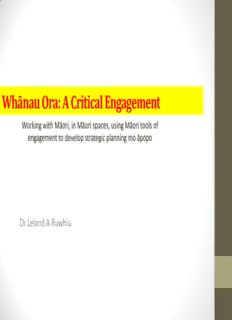
Rising Above Tokenism A whanau ora dilemma PDF
Preview Rising Above Tokenism A whanau ora dilemma
Whānau Ora: A Critical Engagement Working with Māori, in Māori spaces, using Māori tools of engagement to develop strategic planning mo āpopo Dr Leland A Ruwhiu diverse realities impact on Whanau ora Tangata Whenua Diverse realities Tino Rangatiratanga Maoritanga Whakapapa Maori Blended New Zealander Iwi-Nationhood Maori-Pride/Dominant Maori Focussed Ethicities dominant Oneness/sameness Understands Mana whenua Strongly identifies as Maori Dealing with levels of identify as Maori Range of relalities Minimal/no/anti cultural contact Culture in tact Culture stable Bicultural, 1/2 castes 1/16 and others Identify with main stream NZ Our view Our ways Our aspirations Our voices Our stories Our places Our time My non negotiables • Not interested at all in entering into this debate without my tikanga in tact. • No energy nor time to look at Tauiwi development. • For example . . . Average life span - Maori male in Aotearoa. • More interested in clearly identifying my place in the development of whanau • Gangan’s contribution . . . Key points • Dads contribution - wairua • Wairua moments/An Epiphany/an Aha moment. • “I will not let anyone walk through my mind with their dirty feet” Mahatma Gandhi • “Humble beginnings keeps me grounded as it reminds me of the struggles to get me to where I am today” Riki Paniora (2009) • Riki Paniora’s contribution • Oppression & meeting at the border He Wero LENIC • What are our land marks and our stories that identify who we are? • Are the rights of the whanau (family) more important than the rights of the individual? • Should important pieces of information be written down or kept in people’s hearts? • What level of respect do you give to people, is it according to their achievements or their seniority i.e. age? • Is an individual a whanau and can you become whanau to those you work with? • Why do wahine wear black at tangi? • How is it that we are encouraged not to talk about ourselves? Work the thinking . . . • Lets break Bread . . . Whānau ora framework • Ko Au • He ngakau Māori • Te Mahi whakamana • Measured by: • Wairua • Whānau • Tikanga Matauranga • Mauriora • Mana • Ko au Māori Social Policy Dr Leland A Ruwhiu Five Key Characteristics of Māori Social Policy • History is an integral part of Maori social Policy. • Maori conceptual frameworks are a critical part of Maori social policy. • Maori methods of practice. • Maori participation/ownership. • Integrated policies Five key principles • Continuity. • Cultural integrity. • Cultural relevance. • Tino rangatiratanga. • Integration/balance.
Description: